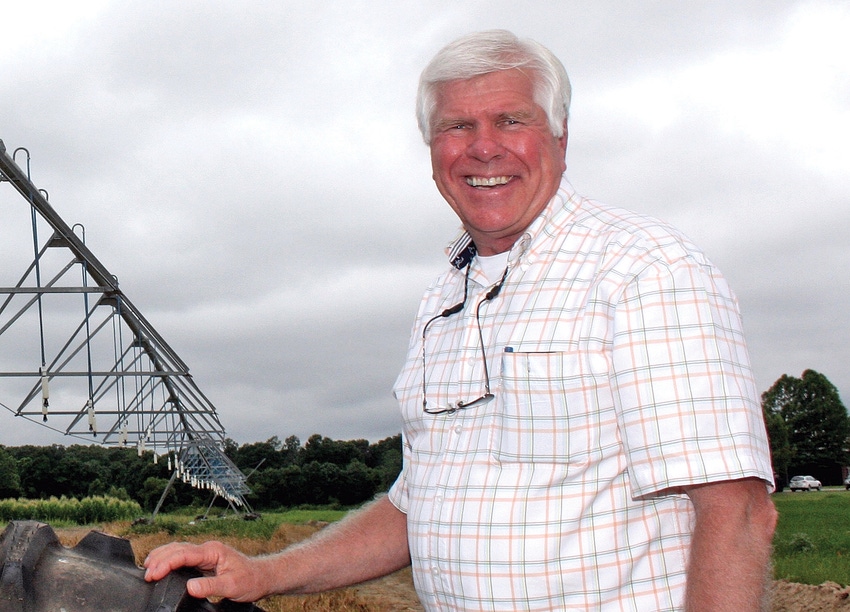
Conservation districts honor John Charles Wilson
John Charles Wilson, farmer and current president of Agricenter International, is being honored for his conservation efforts. In the Beaver Creek Watershed study, Wilson proved that farmers could dramatically reduce soil loss and effectively protect streams with best management practices and no-till.
July 18, 2014

The National Association of Conservation Districts recognized Agricenter International president John Charles Wilson for his lifetime commitment to conservation and agriculture during the association’s Southeast regional meeting in Louisville, Ky., July 11-13, 2014, at the Marriott Louisville Downtown.
“I am very honored and pleased by this induction,” said Wilson, who is only the eleventh person to receive this honor. Past inductees include the late Tennessee Lieutenant Governor John S. Wilder.
Stay current on what’s happening in Mid-South agriculture: Subscribe to Delta Farm Press Daily.
Wilson has been a supervisor with the Shelby County Soil Conservation District Board since 1979, and currently serves as chairman. He served on the state soil conservation committee from 1985-86, and served as chairman in 1986. He concluded four years as president of the Tennessee Association of Conservation Districts in 1993. He represented TACD on the NACD board for six years.
Throughout his career, Wilson has been pro-active in conservation and environmental issues. He was invited to Washington, D.C. to testify before a congressional subcommittee on soil loss tolerance. He also was instrumental in establishing the seven-year Beaver Creek water quality study on his farm and those of his neighbors, beginning in 1990.
He demonstrated that farmers effectively protect streams and dramatically reduce soil loss by using best management practices and no-till. He worked with a coalition, including the U.S. Geological Survey, Tennessee Department of Environment and Conservation, EPA, University of Tennessee and the Tennessee Extension Service. Wilson was the catalyst in developing the Beaver Creek study into a national model for NRCS that was slated to be replicated in all states.
Wilson has garnered many honors in recognition of his conservation efforts, including the EPA Region IV award (for the Beaver Creek study), the Soil and Water Conservation Society’s Outstanding Conservationist award for 1989, Progressive Farmer Magazine’s first Environmental Stewardship award in 1993, and the USGS honorary project coordinator for Beaver Creek hydrologic unit area in 1995.
Wilson comes from a 113-year family farm lineage. He actively farmed for 30 years in partnership with his father, Robert Wilson, as Wilson & Wilson Farms, Arlington, Tenn. He later served as the boll weevil eradication officer in charge of a five-county, 80,000-acre cotton-producing work unit.
Wilson has served as president of Agricenter International, in Memphis, Tenn., for 15 years. Under his leadership, two global agricultural corporations, Bayer CropScience and Helena Chemical Company, are investing $20 million in high tech facilities on Agricenter property. This major expansion occurs without any government or taxpayer incentives.
Wilson and his wife of 40 years, the former Susan Hall, have two children, Natalie and Sy.
Each state in the Southeast Region (Va., Tenn., Ky., N.C., S.C., Ga., Ala., Miss., Fla., Puerto Rico and the Virgin Islands) can nominate one person each year for the award and one more under special circumstances. The TACD is celebrating its 70th anniversary this year.
For nearly 30 years, Agricenter International, a self-sustaining, not for profit organization, has been a hands-on showcase for how production agriculture provides a safe and abundant global food and fiber supply. The facility works yearly with approximately 30 agricultural companies that conduct research on cotton, soybeans, corn, rice and other crops grown on the Agricenter acreage. Agricenter provides a close-up look at production agriculture to schoolchildren, area residents and one million yearly visitors from across the country and around the world.
You May Also Like



